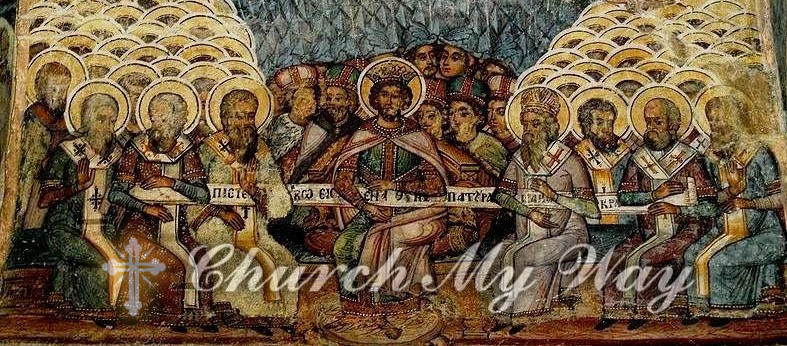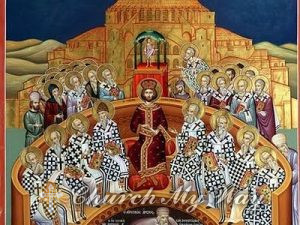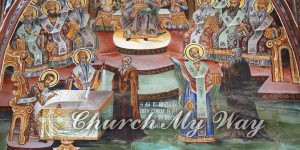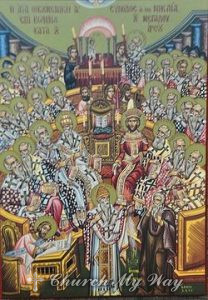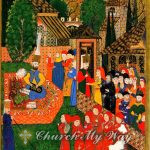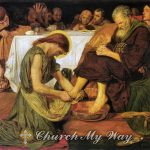The History of the Ecumenical Councils and What Influenced Them
The Ecumenical Councils are a series of councils, or meetings, in which Church leaders from around the world come together to discuss and decide on important matters that affect the entire Church.
The first seven ecumenical councils were held between the years 325 and 787, with the aim of resolving disputes among Christian churches about doctrine and practice. What led to the calling of these councils, and what were their most important decisions?
- FIRST COUNCIL OF NICAEA (325) – Affirmed the deity of Christ. The false doctrine of Arianism was rejected. It was called by Emperor Constantine in order to resolve the Arian controversy, which was a dispute over the nature of the relationship between Jesus Christ and God the Father. The council declared that Jesus was of the same substance as the Father, and this doctrine became known as the doctrine of the Trinity.
- FIRST COUNCIL OF CONSTANTINOPLE (381) – Clarified the nature of the Holy Spirit. It was called in order to resolve the Arian controversy, which was a dispute over the nature of the relationship between Jesus Christ and God the Father.
- COUNCIL OF EPHESUS (431) – Clarified the nature of Christ’s personhood. The false teaching of Nestorianism was repudiated. It was called in order to resolve the Nestorian controversy, which was a dispute over the nature of the relationship between Jesus Christ and God the Father.
- COUNCIL OF CHALCEDON (451) – Clarified the teaching concerning Christ’s nature and person, including the “hypostatic union.” The false doctrine of monophysitism was rejected. It was called in order to resolve the Nestorian controversy, which was a dispute over the nature of the relationship between Jesus Christ and God the Father.
- SECOND COUNCIL OF CONSTANTINOPLE (553) – Confirmed the conclusions of the first four councils. It was called in order to resolve the Monophysite controversy, which was a dispute over the nature of the relationship between Jesus Christ and God the Father.
- THIRD COUNCIL OF CONSTANTINOPLE (680–681) – Clarified the nature of Christ’s will. It was called in order to resolve the Monothelite controversy, which was a dispute over the nature of the relationship between Jesus Christ and God the Father.
- SECOND COUNCIL OF NICAEA (787) – Established guidelines for the veneration of images. (Some Protestants reject this council while accepting the Council of Hieria of 754, which rejected the veneration of icons.) It was called in order to resolve the Iconoclast controversy, which was a dispute over the use of images in worship. The council declared that images could be used in worship, and this decision became known as the doctrine of the Trinity.
There have been seven ecumenical councils in the history of Christianity. These councils were held at different times in different locations and have had different purposes. The first three ecumenical councils – Nicaea I, Constantinople I, and Ephesus I – were called to define what it meant to be Christian. The next three ecumenical councils – Chalcedon 451 A.D., Constantinople II 553 A.D., and Nicaea II 787 A.D.- were called to discuss how Christ is related to God the Father and how Jesus is related to us as humans when he died.
The ecumenical councils are a series of gatherings that are convened from time to time to address the Christian faith. They were convened by the Roman Catholic Church and Eastern Orthodox churches, with the goal of reaching a consensus on matters that pertain to Christian doctrine. The councils have been held since 325 AD, but they were not called ecumenical councils until much later.
There have been 7 ecumenical councils in total. The first four were called into being by the Roman Emperor Constantine I and were focused on theological issues such as Arianism, which is a Christian belief that Jesus Christ is subordinate to God the Father and not equal in power or eternity. The next three (the Fifth, Sixth, and Seventh) were called into being by the Byzantine Empire’s Justinian I and his successors.
The Role of The Ecumenical Councils in the Church Today
The Ecumenical Councils have been a part of the Church for a long time. These councils are gatherings of bishops and other clergies from all over the world to discuss and debate what is happening in the Church. They have been held for centuries and have helped shape Christianity as we know it today.
Ecumenical Councils are gatherings of bishops, clergy, and laity from all over the world to discuss and debate what is happening in the Church. The councils have been held for centuries, shaping Christianity as we know it today.
The Ecumenical councils were established in the early 20th century to bring together churches and denominations that were historically separated.
The Ecumenical councils are not actively involved in the Church today. They do not have any functions left to perform. However, they still exist and their main purpose is to promote unity among Christian denominations.
How the Churches Work Together To Make Decisions
There are several churches in the world and each church has its own belief system. This can lead to confusion when it comes to making decisions that affect the entire church. For example, if a church is deciding on whether or not to allow women as pastors, there may be two churches that disagree with this decision.
The United Methodist Church is one of the most diverse Christian denominations in the world. There are more than 100 denominations in the United States alone (including those within The United Methodist Church). The diversity of beliefs can lead to disagreements on how to make decisions for all of these churches.
The decision-making process of churches is not a straightforward one. It requires a lot of time and effort from the church members and leaders to come up with the best decisions for their church.
Some churches have their own decision-making process, while others use a more traditional approach. The most common way that churches make decisions is through voting.
Conclusion: The Ecumenical Councils Have Always Had A Major Impact On The Church
The Ecumenical Councils have always had a major impact on the church. They have impacted the church in many ways, including religious practices and doctrines.
The Ecumenical Councils have had a major impact on the Church in many ways, including religious practices and doctrines.
The Ecumenical Councils have had a major impact on the Church in many ways, including religious practices and doctrines. The first Council, held in Nicaea in 325, was called to settle a dispute concerning the nature of Jesus. The First Council led to the Nicene Creed, which says that Jesus is “God from God, Light from Light, true God from true God” and “begotten not made”.
List of the 7 Ecumenical Councils:
- The first ecumenical council was held in Nicaea in 325.
- The second ecumenical council was held in Constantinople in 381.
- The third ecumenical council was held in Ephesus in 431.
- The fourth ecumenical council was held in Chalcedon in 451.
- The fifth ecumenical council was held in Constantinople in 553.
- The sixth ecumenical council was held in Constantinople in 680.
- The seventh ecumenical council was held in Nicaea in 787.
The remainder of the councils are accepted by the Roman Catholic Church but not by Protestants:
FOURTH COUNCIL OF CONSTANTINOPLE (869) – Condemned a council that had not been authorized.
FIRST LATERAN COUNCIL (1123) – Placed limitations on the ecclesiastical rights of lay princes and made plans for a crusade to regain territory lost to Muslims.
SECOND LATERAN COUNCIL (1139) – Condemned the errors of Arnold of Brescia.
THIRD LATERAN COUNCIL (1179) – Condemned the Albigenses and Waldenses and issued numerous decrees for the reformation of morals.
FOURTH LATERAN COUNCIL (1215) – Added more condemnation of the Albigenses, condemned the Trinitarian errors of Abbot Joachim, and published other reformatory decrees.
FIRST COUNCIL OF LYONS (1245) – Excommunicated and deposed Emperor Frederick II and authorized a new crusade.
SECOND COUNCIL OF LYONS (1274) – Provided for a temporary reunion of the Greek Church with Rome and set rules for papal elections.
COUNCIL OF VIENNE (1311–1313) – Addressed crimes and errors imputed to the Knights Templar, the Fraticelli, the Beghards, and the Beguines. Also took on projects of a new crusade, the reformation of the clergy, and the teaching of Oriental languages in the universities.
COUNCIL OF CONSTANCE (1414–1418) – Ended the Great Schism with the election of Pope Martin V.
COUNCIL OF BASEL/FERRARA/FLORENCE (1431–1439) – Moved from city to city due to trouble. This resulted in temporary reunification with the Greek Church and made official the seven sacraments of Catholicism.
FIFTH LATERAN COUNCIL (1512–1517) – Authorized a new crusade against the Turks but was quickly overshadowed by the “trouble” caused by the Protestant Reformation.
COUNCIL OF TRENT (1545–1563) – Condemned the teachings of Luther and the Reformers and officially recognized the Apocrypha as canonical.
FIRST VATICAN COUNCIL (1869–1870) – Affirmed the infallibility of the Pope when speaking ex-cathedra.
SECOND VATICAN COUNCIL (1962–1965) – Promoted various reforms and clarifications of church practice.
